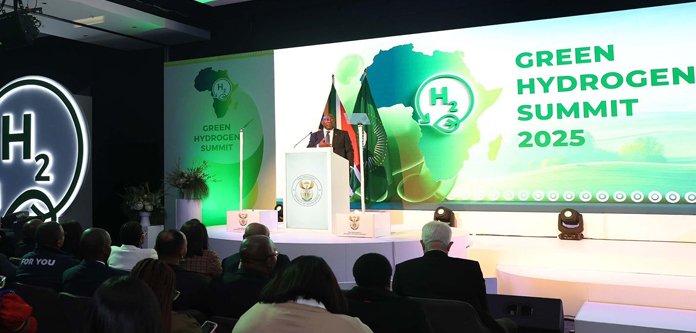At the highly anticipated Green Hydrogen Summit 2025 in Cape Town, South African President Cyril Ramaphosa delivered a stirring keynote address, urging African nations to position themselves at the forefront of the green hydrogen revolution. Speaking to a packed audience of energy leaders, policymakers, and investors from around the world, Ramaphosa described green hydrogen as a “transformative catalyst” for industrial growth, energy independence, and inclusive economic development across the continent.
“Africa cannot afford to be a spectator in the global shift to clean energy,” Ramaphosa declared. “The Green Hydrogen Summit 2025 marks a turning point—we must seize this moment to chart a sustainable, sovereign, and prosperous future.”
Green Hydrogen: Africa’s Clean Industrial Opportunity
Green hydrogen, produced through electrolysis using renewable energy sources like wind and solar, has emerged as a game-changing energy carrier. It offers a zero-emission alternative for hard-to-decarbonize sectors such as steel, cement, fertilizers, and heavy transport—industries in which Africa holds enormous growth potential.
Ramaphosa emphasized that the continent’s abundant renewable resources, young workforce, and strategic location give it a natural advantage in building a green hydrogen economy.
“We are not starting from behind. Africa has the sun, the wind, the land, and now—the vision,” he said.
South Africa’s own Hydrogen Valley Project, already in motion, was showcased as a continental model. The project, supported by a public-private partnership including Sasol and the IDC, aims to connect hydrogen production sites with major industrial corridors, boosting both energy resilience and job creation.
Unlocking Inclusive Growth Through Hydrogen
In his address, Ramaphosa outlined the social and economic imperatives of embracing green hydrogen. With over 600 million people in Africa still lacking access to electricity, hydrogen offers a route not only to cleaner power but to universal energy access.
“This isn’t just about energy—it’s about equity,” Ramaphosa stressed. “Green hydrogen must power our factories, fuel our economies, and lift our people out of poverty.”
He called for inclusive policies that ensure communities, particularly those in underdeveloped regions, are meaningfully involved in hydrogen infrastructure, training, and ownership. “No African must be left behind in this green revolution,” he urged.
Mobilizing Investment and Policy Support
The Green Hydrogen Summit 2025 also served as a high-level platform to attract foreign direct investment and policy alignment. Ramaphosa appealed to global financiers, development banks, and private-sector leaders to co-invest in Africa’s hydrogen future.
He proposed the creation of a Pan-African Green Hydrogen Framework, which would harmonize standards, incentivize cross-border trade, and de-risk investments across the continent. Talks of a continental hydrogen market, aligned with the African Continental Free Trade Area (AfCFTA), were met with enthusiasm from several attending ministers and CEOs.
Energy Security in a Volatile World
President Ramaphosa tied the green hydrogen agenda to Africa’s urgent need for energy sovereignty. He cited recent energy price spikes, climate-induced droughts, and global supply disruptions as wake-up calls for the continent to shift away from fossil dependency.
“Green hydrogen gives us the power to break the chains of imported energy,” he said. “It’s not just green—it’s African, and it’s strategic.”
South Africa’s pledge to achieve net-zero emissions by 2050 includes green hydrogen as a core pillar, with multiple pilot plants and export agreements already underway. Namibia, Egypt, and Morocco were also lauded for advancing their hydrogen roadmaps.
Industry, Experts Applaud Ramaphosa’s Vision
Dr. Amina Ibrahim, energy policy expert at the African Union Commission, hailed the speech as “visionary and catalytic.” She added, “This sets the tone for a united African hydrogen agenda that serves people and planet.”
Industry players including Siemens Energy, Toyota, and Shell expressed readiness to expand partnerships in Africa, highlighting a shift in investor appetite toward decarbonized industrial platforms.
“The President’s message was clear—Africa must lead. And we at Siemens are ready to walk that path,” said Tobias Friedrich, Siemens’ Africa CEO.
A Hydrogen-Powered Future in Sight
As the summit concluded, delegates signed a joint declaration committing to accelerate green hydrogen development, skills transfer, and infrastructure sharing across borders.
With over 30 countries represented, Green Hydrogen Summit 2025 is being called a landmark event in Africa’s energy transition journey.
Ramaphosa closed his speech with a powerful call to action:
“Let this summit be remembered not as a conference, but as a beginning. The world is watching. The future is green. And Africa is ready.”





